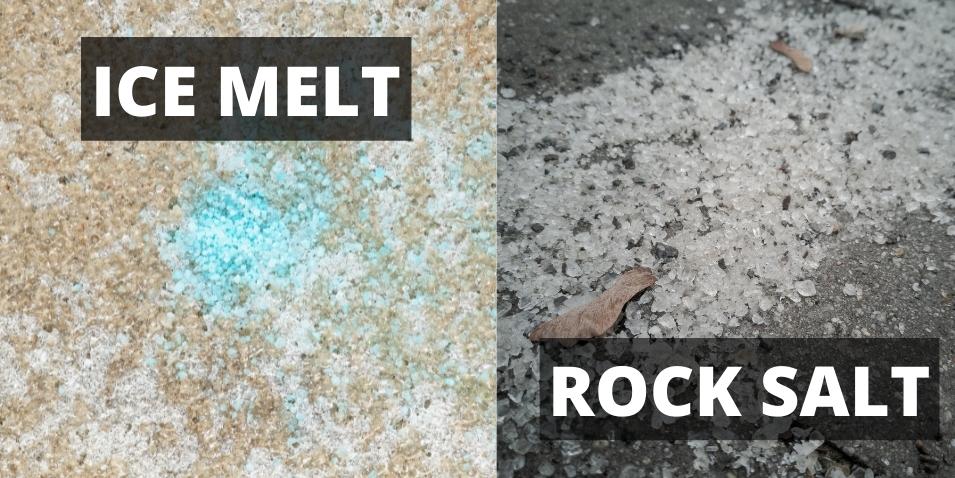The responsibility of commercial property maintenance falls upon you as the owner or manager. During the colder months, this includes removing ice from walkways to prevent people from slipping and falling, which can result in serious injuries. Ice melt and rock salt both accomplish this by initiating a chemical reaction that turns the ice into a compound called brine. Because brine has a lower melting point than water, it turns the ice back into a liquid. You can use either rock salt or ice melt to treat your walkways and parking lots. Each has its own advantages and disadvantages.
Ice Melt Pros and Cons
There are many different types of ice melt made with different chemical compounds that contain chlorine. Ice melt products can be made with calcium, magnesium, and potassium chlorides. If the temperature is very cold, ice melt is more efficient because it works at a temperature of -15 degrees Fahrenheit, while rock salt is ineffective at temperatures lower than 5 degrees Fahrenheit. Ice melt is ideal for entrances, walkways, and other high-traffic areas because it works more quickly than rock salt.
The chemical reaction that occurs when any type of deicer is applied to frozen pavement produces heat. People usually aren’t affected by it because they wear shoes or boots on their feet when walking outside during the winter. However, the heat may damage nearby plants or the unprotected pads of pets that walk barefoot over the pavement. Ice melt poses less of a danger to pets and plants than rock salt. It is also less likely to permanently damage the pavement.
Ice melt consists of finer grains than rock salt, which can be either an advantage or a disadvantage, depending on the situation and your personal preferences. Compared to rock salt, ice melt is double the cost.
Snow Tech uses primarily Jet Blue Ice Melter as a bagged product to spread on sidewalks and parking lots. It is effective to -32 C or – 26 F. For more information on this product click here.
Liquid Ice Melter
ProMelt Mag is a high performance magnesium chloride liquid that we mix with rock salt as it comes out of the SaltDogg salt spreaders for parking lots. Adding this liquid slurry to the salt helps the rock salt work at lower temperatures than traditional rock salt alone. By combining the two products, we can also help to control costs to the end consumer. This is an approved organic product in Canada. We store 6,000 gallons of liquid on site and distribute it on our trucks using 100-gallon tanks.
Growing the Industry
As an effort to educate ourselves with the new trends in the industry and share our knowledge with other contractors, Snow Tech has joined the Peer Group through Nextra Consulting to meet monthly with other contractors and discuss Liquids Use.
Rock Salt Pros and Cons
Rock salt consists of sodium chloride, the same salt that you keep in your kitchen for seasoning food while cooking and eating. The only difference between the two is that rock salt comes in large chunks, which is how it got its name. While it works the same as ice melt to produce liquid brine through a chemical reaction, the big chunks also help to form a non-slip surface over the ice and provide traction for those who may be walking by.
One of the main disadvantages of rock salt is that it is more likely to be harmful to plants on your property, and potentially to animals such as dogs and cats, should they have occasion to walk across it. Rock salt is also more likely to cause permanent damage to the pavement that forms your walkways. Perhaps you have seen concrete stained white by rock salt application. It can also seep into the concrete itself, attracting water and accelerating deterioration caused by the cycle of freezing and thawing. Furthermore, rock salt doesn’t work as quickly as ice melt, nor is it as effective at colder temperatures.
Contact Snow Tech for Year-Round Commercial Property Maintenance
Winter is a fact of life in Canada, and ice and snow removal services are necessary to prevent injuries and protect your company from liability. In the interest of protecting the environment, Snow Tech offers several different ice melt options and customizes the application spread rate to ensure that the salt level remains safe. Find out more about the risks to your property from winter weather and what we can do to help mitigate them.

